Nestled along the idyllic west coast of Luzon, Philippines, Subic Bay is becoming a prime destination for expatriates seeking a tranquil yet dynamic living experience.
If you are one of them, this guide will give you all the facts and information to help you decide whether Suboc Bay is the right destination.
In this guide:
- Practical information: Visas and residency, living costs, available amenities, facilities, and local transportation.
- Real estate: What’s available, your options, and costs.
- Healthcare: Healthcare facilities, available services, and health insurance options.
- Schools: International schools and other educational facilities for expat children.
- Travel options & infrastructure: Subic Bay connectivity and convenience for traveling locally and internationally.
- Leisure and entertainment: From top tourist attractions to offbeat local secrets, we’ve listed various activities to keep you busy.
The highlights of Subic Bay
With its rich history as a former US naval base, Subic Bay has evolved into a thriving residential hub renowned for its pristine landscapes, economic vigor, and welcoming community.
- Proximity to Manila: Subic Bay is located approximately 100 kilometers northwest of Manila.
- Picturesque surroundings: The Bay spans over 60 square kilometers, boasting picturesque beaches, verdant forests, and expansive waterfront views.
- Thriving economy: The Subic Bay Freeport Zone, a special economic and trading zone, fosters a business-friendly environment, attracting a range of industries and, consequently, modern facilities and amenities.
- Great activities: Subic Bay offers various recreational activities, from water sports and eco-tours to golf courses and adventure parks.
- Diverse expat community: Subic Bay boasts a diverse expatriate community of approximately 2,000 (and growing) people.
Visas and residency options
Foreign nationals intending to stay in the Philippines for over 30 days must secure a visa. Standard options include the tourist visa, work visa, and retirement visa.
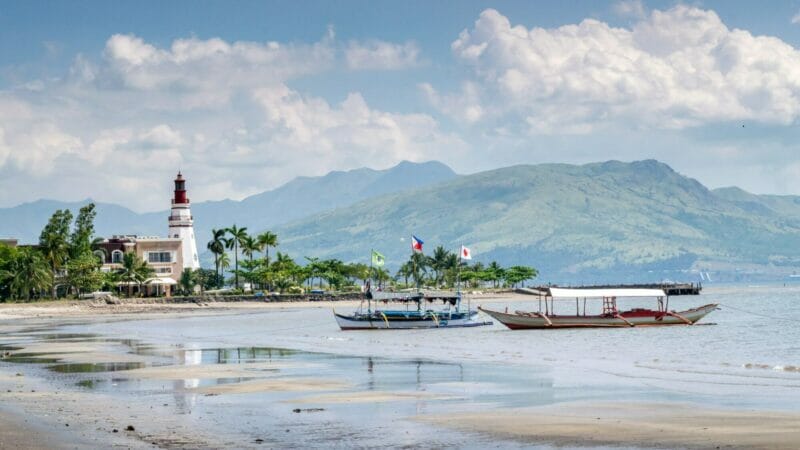
The Special Resident Retiree’s Visa (SRRV) is the most popular choice for expats. It is a non-immigrant, lifetime visa granted by the Philippine government to foreign nationals or former Filipino citizens.
The advantages of securing an SRRV:
- Indefinite stay: With an SRRV, you can live, retire, and even work in the Philippines indefinitely. This takes away the stress of having to extend your visa status continually.
- Multiple-entry privileges: This visa grants its holders multiple entry privileges, making trips in and out of the Philippines hassle-free.
- Exemption from travel tax: Unlike other visa holders, with an SRRV, you are exempted from paying travel taxes if your stay in the Philippines is over a year.
- Access to Greet and Assist Program at selected ports: assistance with language barriers, health services, visa, immigration, and baggage retrieval upon arrival. Your designated assistant helps with airport security clearance and expedites immigration and border control processes.
- Permission to work or invest: Feel like dipping your toes into entrepreneurship or the job market? The SRRV allows you to establish a business or be gainfully employed in the Philippines.
- Inclusion of dependents: You can include your spouse and unmarried children (below 21 years) as dependents on your SRRV.
- Access to local benefits: An SRRV holder is eligible for benefits under the Philippine Health Insurance Corporation (PhilHealth) and can partake in the Social Security System (SSS).
You can find more information on various retirement visa types, tourist visas, and digital nomad visas in our Moving To The Philippines guide.
The cost of living and expenses
Subic Bay offers a relatively affordable cost of living compared to major urban centers.
On average, monthly expenses for a single person can range between $900 and $1,500, covering accommodation, food, transportation, utilities, and entertainment.
Housing costs
Housing costs can vary widely based on the type of accommodation and location, with apartment rentals starting from $300 per month in cheaper areas.
Monthly rent for a furnished one-bedroom apartment can start at around $300, while larger properties with multiple bedrooms can range from $500 to $800 or more, depending on location and amenities.
Utilities
Monthly utility bills for a standard apartment can average around $70 to $100. Water bills typically range from $10 to $20 per month, depending on consumption.
Local SIM cards from providers like Globe and Smart offer cost-effective communication solutions.
Local transportation
Subic Bay’s transportation options are very much like those of the rest of the country: tricycles, jeepneys, taxis, and buses.
Jeepneys, the iconic Philippine mode of transportation, offer affordable rides around the area, with fares typically ranging from $0.20 to $1.
Tricycle fares start at around $0.50 for short distances.
The Subic Bay Metropolitan Authority (SBMA) operates a shuttle service within the Freeport Zone for convenient travel.
Real estate in Subic Bay
Subic Bay offers a variety of housing options, including apartments, condos, houses, and villas. You won’t have any problem finding a place to rent.
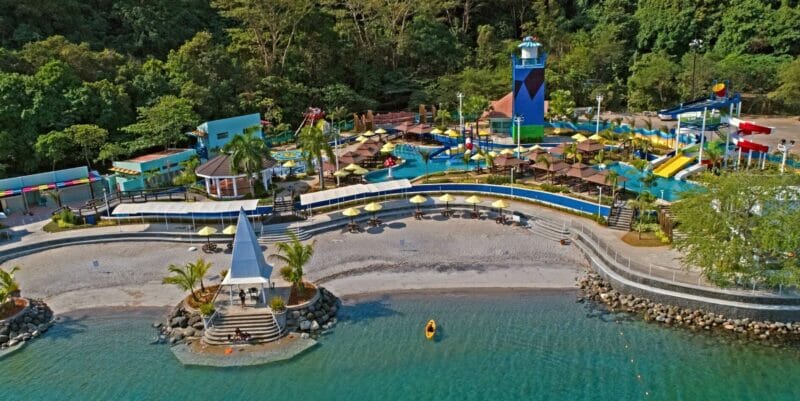
When it comes to buying options, keep in mind the following:
- Land ownership: The Philippines’ constitution prohibits foreigners from direct land ownership.
- Long-term leases: Foreigners can lease land for up to 50 years, and the lease is renewable for another 25 years.
- Condominium ownership: On a brighter note, foreigners can own condominium units as long as 60% of the building’s ownership is Filipino. This is a popular option among expats as it allows you to invest in the Philippine real estate market directly.
For more information on land ownership and property in the Philippines, read our Moving To The Philippines guide, Property Section.
If you lean towards extravagance, high-end condos dotting the bay and the city are up for grabs, typically priced between $270,000 to $800,000 and higher. These properties often come with top-tier amenities and sprawling spaces.
If you are trying to keep an eye on the purse strings, more affordable options are plentiful. A small apartment starts at about $50,000.
Renting a home in Subic Bay
The local rental market offers everything from chic condos and spacious apartments to luxurious villas and townhouses.
Theoretically, you can look for rentals online at Lamudi, Zipmatch, DotProperty, or other rental sites.
In practice, however, it is easier to rent a short-term holiday apartment before you arrive and then spend time looking at the neighborhoods and enquiring locally.
When you find something you like, contact the landlord or property agent, arrange a property visit, and sign a lease agreement if everything’s to your liking.
The lease agreement usually requires a 1-2 month security deposit and payment of the first month’s rent upfront.
Renting a one-bedroom spacious and modern condo in a good area close to all the amenities can start from $ 1,000 a month.
More affordable options can be found for around $500.
Where to live in Subic Bay
The Subic Bay Freeport Zone: This is one of the safest and most well-maintained areas in the bay, giving you access to amenities, entertainment, and various housing options.
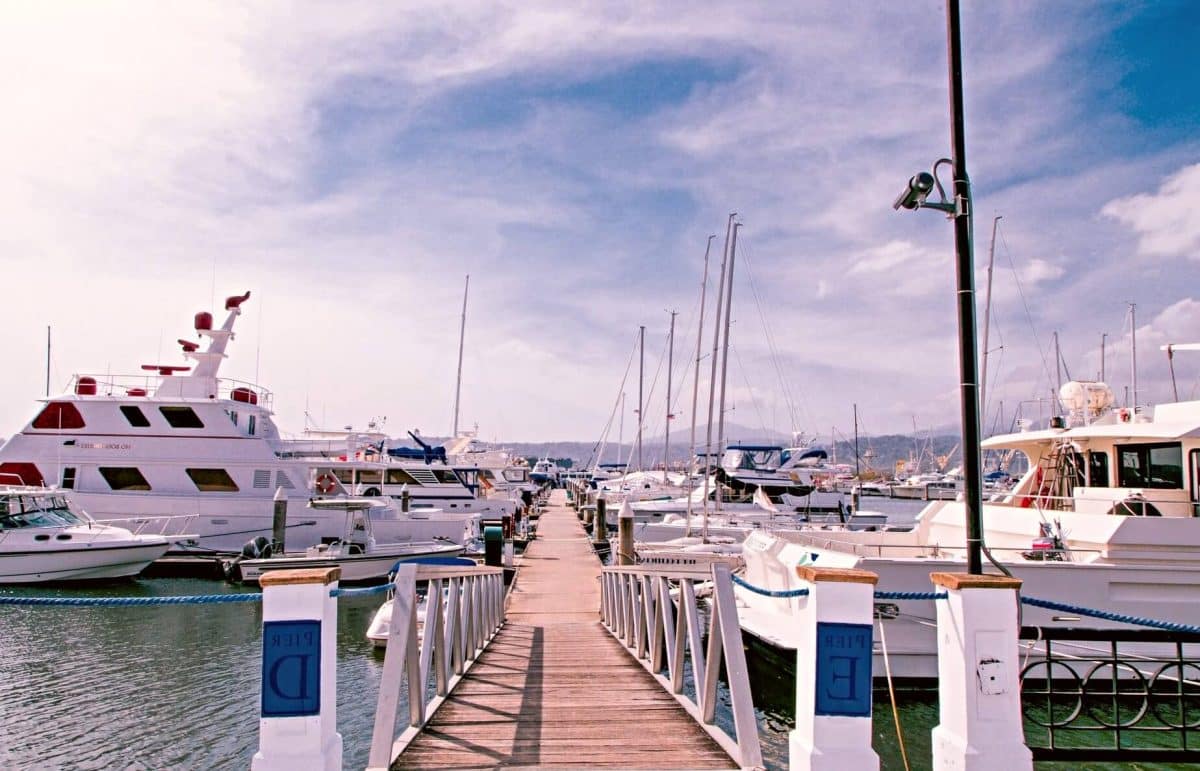
Barretto: Known for its proximity to the beach and lively expat community, Barretto offers a mix of apartments and houses for rent.
Subic Town: This area provides a quieter ambiance, with a selection of residential properties surrounded by greenery.
Binictican: A well-maintained and secure area, Binictican offers both apartments and houses and modern amenities in the vicinity.
Kalayaan Heights: Nestled in Subic Bay, Kalayaan Heights offers modern apartments and spacious houses in gated communities. It is very close to the Subic Bay Freeport Zone, providing its residents with easy access to all the Freeport Zone amenities.
Cubi Point: Close to the Subic Bay Freeport Zone, offering residential choices in proximity to business centers.
Mabayo: A peaceful area with a range of residential properties known for its serene surroundings.
Olongapo City: While not within Subic Bay, it’s a nearby city with a variety of housing options and urban amenities.
Gordon Heights: A residential district near Olongapo City offering diverse housing choices.
Boton Area: Located within the Subic Bay Freeport Zone, with proximity to various attractions and facilities.
Baloy Beach: Known for its beachside resorts, Baloy Beach is a small, tight-knit community roughly 20 minutes from the Free Port Zone along the National Highway.
Subic Bay transport and travel options
Subic Bay offers a strategic location with multiple transport options, facilitating convenient travel to both nearby destinations and international gateways.
To Manila and nearby
Subic Bay is located approximately 110 kilometers (68 miles) from Manila, a drive that takes around 2 to 3 hours via the North Luzon Expressway (NLEX) and the Subic-Clark-Tarlac Expressway (SCTEX).
Private car rentals are available, with prices starting at approximately $40 per day.
Public buses operated by Victory Liner and Genesis Transport provide economical options, with fares averaging $10 to $13 for a one-way trip to Manila.
Flights and air travel
The Subic Bay International Airport is a convenient gateway for domestic and limited international flights. Domestic flights from the Subic Bay International Airport to destinations like Cebu typically start at around $100 one way.
You can also get connected flights via Clark International Airport.
Clark International Airport, around 60 kilometers (37 miles) away, provides more flight options and connections.
Sea travel and ferries
The Subic Bay Freeport Zone is home to the Subic Bay International Container Terminal (SBITC).
While primarily a cargo terminal, select passenger ferry services connect nearby islands and coastal destinations.
Public transportation to other cities
Buses, vans, and jeepneys provide transportation to neighboring cities and towns.
Local travel agencies offer guided day trips to destinations like Mount Pinatubo and heritage sites.
Is buying a car a good option?
Although at first glance, it might look like you can live without a car quite comfortably here, owning a car gives you more flexibility and travel freedom. The road infrastructure in the bay is pretty good, too, so you won’t experience traffic jams and delays.
Living in Subic Bay with a family
Subic Bay is generally a safe area and considered a family-friendly option, as it has low crime rates and a welcoming community.
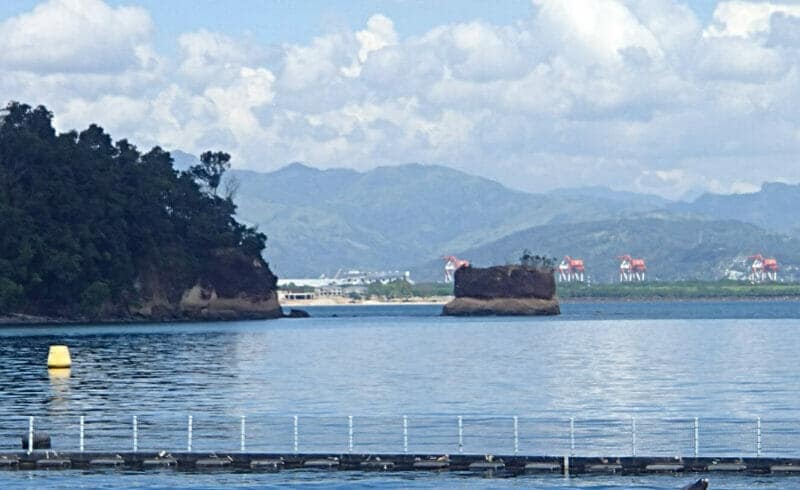
The presence of security personnel in residential areas and public spaces adds to the sense of security.
Schools and education in Subic Bay
Subic Bay offers a range of educational choices, including international schools, local schools, and homeschooling.
Here’s a list of the most popular schools:
- Brent International School Subic is a reputable institution offering an international baccalaureate program.
- Astorian Hill School is a private school offering preschool services and 12 years of basic education.
- Subic Bay College is a private school offering preschool, elementary, high school, and vocational courses.
- Lyceum of Subic Bay is a non-profit higher educational institution.
- Mondriaan Aura College – undergraduate and post-graduate studies
Family-friendly activities
Subic Bay offers a host of family-friendly activities to enjoy. Explore attractions like Zoobic Safari, Ocean Adventure, and Treetop Adventure, providing over 20 engaging rides and activities.
Discover the Subic Bay Boardwalk and enjoy its 4-kilometer stretch.
For water enthusiasts, Inflatable Island offers a massive 4,200 sqm aquatic playground, and Subic Bay Yacht Club provides access to sailboats, jet skis, and paddleboards.
With over 30 restaurants and a huge 4,000 sqm indoor playground at Ayala Mall Harbor Point, family-centric options are abundant in Subic Bay.
Healthcare facilities and health insurance
Subic Bay has well-equipped medical facilities, specialist consultations, and a range of clinics and health centers.
Hospitals and medical centers
Baypointe Hospital and Medical Center: Located at Moonbay Marina within Subic Bay Freeport Zone, this medical facility delivers top-tier medical care. To ensure patient comfort, the center encompasses a wellness facility, private accommodations, and a conference space.
TotalMed Subic Ambulatory and Medical Center offers specialized services in pathology, radiology, pediatrics, general surgery, cardiology, pulmonology, gastroenterology, and ophthalmology.
Lifeline Medical Center: A trusted private hospital with proficient physicians and healthcare staff. Specializes in nephrology, pediatrics, orthopedics, urology, cardiology, and general medicine.
There are more hospitals and clinics in Olongapo City.
Health insurance
As an expat in the Philippines, you have three options when it comes to your health insurance:
1. Join the state health insurance program. For cost-effective health coverage in the Philippines, consider PhilHealth, the most budget-friendly option for expats.
PhilHealth is mandatory if you plan to stay in the country for six months or longer and are employed. If you are not employed, you can pay into PhilHealth voluntarily.
2. Purchase local private health insurance. Private health insurance gives you full access to all hospitals and clinics. It also means a more private, secure, and comfortable hospital stay in more serious circumstances.
3. Purchase international health insurance. International health insurance offers coverage regardless of your location, excluding any specified territories. Should you move to another country, the coverage seamlessly transitions with you to your new location.
On the negative side, it can be quite expensive. To ensure you get the best value for money, compare international health insurance options from various providers to find the best deal.
Things to do in Subic Bay
Outdoor adventures
Water sports enthusiasts can indulge in activities such as kayaking, snorkeling, hoverboarding, parasailing, and jet skiing in Subic Bay’s pristine waters.
The nearby Mount Pinatubo offers hiking trails that lead to breathtaking crater views, appealing to outdoor adventurers.
Sailing and yachting
Subic Bay is a prominent destination for yachting and sailing, with the Subic Bay Yacht Club offering a 300-berth marina.
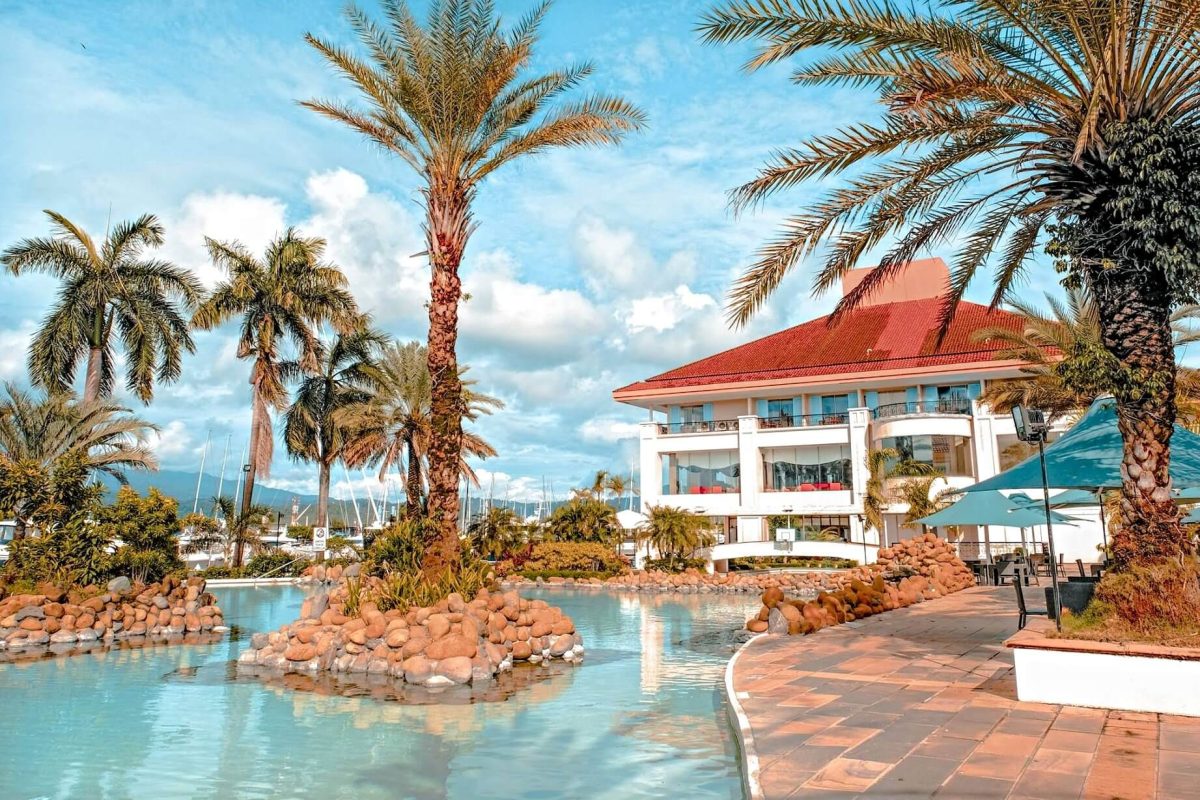
Here, you can access a diverse fleet of over 50 sailboats and powerboats.
Renting a yacht is also easy, with prices starting at approximately $750 for 3 hours.
Mooring fees are around $47 per day, while Subic Bay Yacht Club membership fees start from $530 annually.
The Subic Sailing Club organizes races and regattas regularly, offering a community of sailing enthusiasts.
The bay’s climate, with an average temperature of 29°C and steady winds of 10-20 knots, creates ideal conditions for sailing. The bay’s waters reach a depth of 45 meters, providing ample space for aquatic ventures.
Subic International Golf Club
The former Subic Bay Golf and Country Club was remodeled and opened in 2019 as Subic International Golf Club. It is an 18-hole course stretching over 6,300 yards.
Subic Bay Inflatable Island
Floating on the waters of Subic Bay, this expansive aquatic playground spans a remarkable 4,500 square meters.
Subic Bay Inflatable Island is the ultimate water adventure park with a myriad of swings, trampolines, monkey bars, slides, wiggle bridges, ladders, ramps, and even a colossal unicorn float.
Biking in Subic Bay
If you are a biking enthusiast, you will revel in the picturesque landscapes and serene surroundings that Subic Bay offers.
The area provides a range of biking routes for various skill levels. Beginners can enjoy leisurely rides along the coastal roads, soaking in breathtaking sea views, while more experienced cyclists can tackle challenging trails through the lush forests surrounding the bay.
Subic Bay’s relatively low traffic volume enhances biking safety, but caution is always advised. Local biking clubs organize group rides, providing opportunities for camaraderie and exploration.
Wildlife exploration
Zoobic Safari and Ocean Adventure provide up-close encounters with exotic animals, including tigers, crocodiles, and dolphins.
The Pamulaklakin Forest Trail allows visitors to appreciate indigenous flora and fauna through guided walks.
Subic Bay beaches
Subic Bay beaches are not even half as scenic as those in Boracay, Camiguin, or Palawan. However, they are perfect for enjoying a lovely day out, swimming in the sea, having a picnic, or just soaking up the sun.
You will find several public and private beach resorts in Subic Bay. Renowned options include Camayan Beach Resort, White Rock Beach Hotel and Waterpark, Halfmoon Bay Beach, and Driftwood Beach.
The stunning sunset view is a highlight, best enjoyed by arriving just before dusk to witness the sun gracefully setting below the horizon.
Extreme adventures
Jungle survuval tours
For more exciting and challenging adventures, try a jungle survival tour.
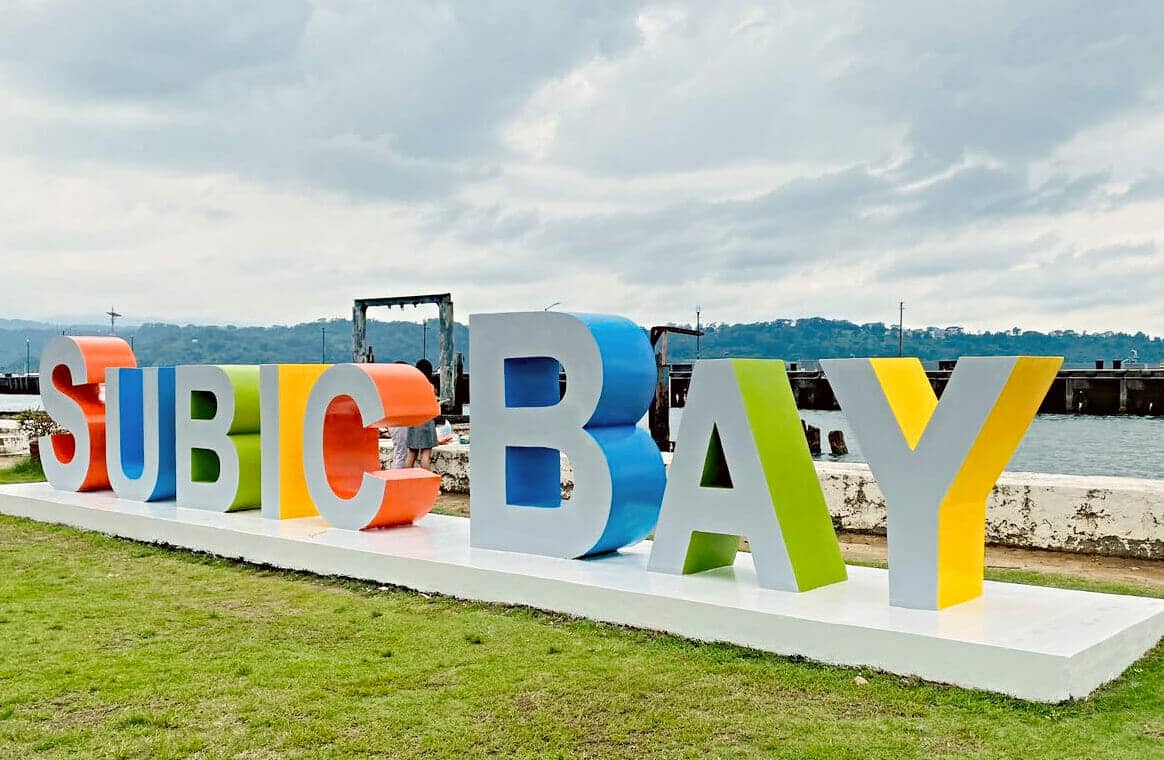
Subic Bay offers immersive jungle survival tours through JEST Camp. These tours last around 3 to 4 hours and cover 16 hectares of terrain. As a participant, you receive survival training from indigenous Aetas, learning fire-making, trap-setting, and foraging skills.
Wreck diving
Take diving to the next level. Subic Bay offers exceptional wreck diving opportunities.
It’s not just wrecks here. The bay’s wrecks boast marine life like batfish, trevally, and snappers, with occasional sightings of eagle rays and turtles.
Exploring the wider area
Subic Bay’s strategic location offers easy access to a range of great destinations for day trips and weekend getaways. Here are a few options to consider:
Clark, Pampanga: Explore the Clark Freeport Zone, known for its duty-free shopping, recreational activities, and historical sites like Nayong Pilipino.
Anawangin Cove: This stunning cove in Zambales is famous for its white sand beach and lush surroundings, perfect for camping and relaxation.
Mount Pinatubo: Hike up to Mount Pinatubo to see its crater lake and stunning views.
Corregidor Island: Explore the historical island fortress, known for its role in World War II, and witness its preserved ruins and war memorials.
Pampanga Culinary Tour: Discover Pampanga’s rich culinary heritage with a food tour, sampling local delicacies and renowned Kapampangan dishes.
Bataan Peninsula: Enjoy beaches, historical sites, and the Bataan National Park, offering hiking trails and wildlife encounters.
Potipot Island: This small paradise near Zambales boasts clear waters, powdery sand, and a tranquil atmosphere, ideal for a relaxing day trip.
These nearby destinations ensure you will never run out of options for day trips and weekend escapades from Subic Bay.
Shopping and entertainment
Dining out
Subic Bay is a mango-growing area, and mangoes are fantastic here and definitely a thing to try, even if you are not a big fan of fruit. You can buy them everywhere, from street fruit stalls to little shops and supermarkets.
The Subic Bay Freeport Zone is full of cafes and restaurants offering food from all over the world.
Most of the dining establishments are concentrated in the Central Business District, notably along Waterfront Road and Rizal Highway, but there are also quite a few restaurants in other areas.
The highlights include Texas Joe’s House of Ribs, Liberty Sports Bar, Xtremely Xpresso Cafe, etc.
The local highlight is seafood sourced fresh from the bay. There are also some delicious meat-based dishes, like Kare Kare, a local dish cooked with rice, meat, and eggplant and served with peanut sauce.
Nightlife and entertainment
On the whole, Subic Bay is not what you call an epicenter of nightlife.
However, you will find various nighttime activities for friends and couples to enjoy together, from sports bars to karaoke to casinos to comedy clubs, dance clubs, and discos, which are more like nightclubs.
The two most popular ones are Nocturnal Disco and Club V, both in downtown Olongapo and a short walk from each other.
Like many popular tourist places in the Philippines, Subic Bay has its share of notorious entertainment venues called Girly Bars. Barrio Barretto, for example, is home to about two dozen of them.
Shows, festivals, and events
The Subic Bay Convention Center hosts various events, concerts, and performances for entertainment seekers, from Subic Bay’s Got Talent to The Ironman to favorite shows and performers touring the country.
Olongapo Grand Mardi Gras is an annual festival held every October 27-29 in Olongapo City’s Central Business District. It features street dancing on Magsaysay Ave., acoustic bands, stand-up comedians, and a Halloween parade with fancy costumes on Halloween-themed floats.
Subic Karakoa Festival is in Subic Bay Freeport, Zambales, to honor the Karakoa warship of the Pintados tribe. The festival features colorful floats, a parade, and a motorcade. It aligns with the Philippine Motorsports Festival and the Karakoa Food Festival.
Subic Sailing Club organizes regular regattas and events for sailing enthusiasts.
Shopping and markets
Duty-free shopping is a big draw in Subic Bay’s attractions.
Predominantly situated in two key locales—Argonaut and Palm Streets within the Gateway District and Rizal and Sampson Road in the Central Business area—duty-free shops attract locals and visitors from Manila.
Watch out for regular weekend discount sales – a good chance for a bargain.
Harbor Point Mall also boasts an extensive and contemporary selection of shops in Subic Bay.
SM City Olongapo provides shopping destinations for fashion, electronics, and essentials.
Plenty of local markets all over the bay offer fresh produce, crafts, and souvenirs and a more entertaining way to shop and interact with locals. The Olongapo market is a must-see: a fantastic place to taste all kinds of local fruit and find affordable restaurants.
Final thoughts on living in Subic Bay
Subic Bay is attractive if you seek a balanced and less hectic lifestyle. It offers a good blend of natural beauty, diverse recreational offerings, quality healthcare services, and reasonable travel links.
It is an ideal choice for expat retirees looking to embrace a fulfilling and comfortable retirement phase in a relatively quiet but well-equipped picturesque setting close to a big city.
You might find useful:
Helpful external links:
- The Subic Bay Metropolitan Authority site – where you can find more information about Subic Bay and the local services
- Municipality of Subic site